Trump warns Iran of ‘bombing like never seen before’ if no deal reached
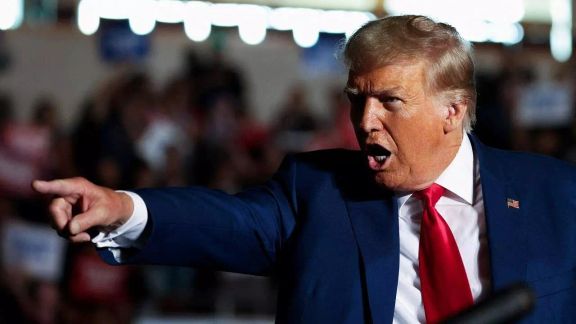
US President Donald Trump on Sunday warned of bombing Iran if Tehran fails to reach a deal over its nuclear program.

US President Donald Trump on Sunday warned of bombing Iran if Tehran fails to reach a deal over its nuclear program.
"If they don't make a deal, there will be bombing — and it will be bombing the likes of which they have never seen before," Trump was quoted as saying during a phone interview with NBC News' Kristen Welker.
Earlier in the day Iran's President Masoud Pezeshkian said the country rejects direct negotiations with the United States, but added that indirect talks can continue.
"The response by the Supreme Leader to Trump's letter was delivered to the US contact in Oman...In that response, direct negotiations have been rejected, but regarding indirect talks, Iran has always been involved in such talks, and the Supreme Leader has emphasized that indirect talks can still continue," Pezeshkian said.
Also on Sunday, government spokeswoman Fatemeh Mohajerani said that "Iran's response to the sent letter was prepared and delivered," as Iran's foreign ministry stressed the confidentiality of the exchanged letters.
Trump on Friday also warned that “bad, bad things” would happen if Tehran did not agree to a nuclear deal.
While Iran denies seeking a nuclear weapon the UN's nuclear watchdog says it has enriched more uranium than any state lacking a bomb.
Last month, Trump signed a directive restoring the so-called maximum pressure policy on Iran of his first term and warned of "catastrophic" consequences if Tehran does not make a deal on its nuclear program.
Trump's maximum pressure approach in his first term beginning in 2018 pummeled Iran's economy, causing a dramatic decline in oil exports and skyrocketing inflation.
Earlier this week, Khamenei's senior adviser Ali Larijani, as well as prominent economists in Tehran said that Iran needs to address its problems with the United States urgently in a bid to lift or reduce US sanctions and give the ailing economy a chance to grow after many years of crises and stagnation.
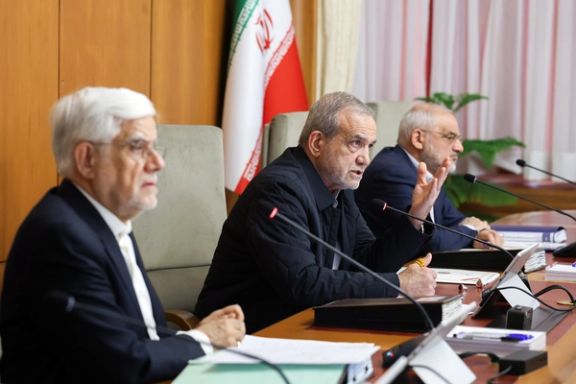
The future of indirect negotiations between Iran and the US hinges on Washington's behavior, the Iranian president said on Sunday following Tehran's response to a letter from President Donald Trump.
Masoud Pezeshkian told his cabinet, "In this response, although the issue of direct negotiation between the two sides has been rejected, it has been stated that the path of indirect negotiation is open."
He emphasized that Iran has never avoided negotiations, and that past issues arose from breaches of promises by the US that need to be rectified to rebuild trust.
"[In the response] it has been emphasized that Iran has never avoided negotiation, and it was only bad faith that caused problems in this path, which must be compensated and trust rebuilt; it is the behavior of the Americans that determines the continuation of the negotiation path," Pezeshkian said.
Earlier reports indicated that Trump's letter proposed discussions on Iran's nuclear program, while Iranian sources said their response reiterated long-standing positions, including a refusal to negotiate on its missile program or regional alliances.
Foreign Minister Abbas Araghchi also said on Thursday that Iran's response was conveyed through Oman, and that while direct talks were off the table under Trump’s so-called maximum pressure and military threats, indirect negotiations could continue.
Earlier on Sunday, Iran's Foreign Ministry emphasized the importance of maintaining the confidentiality of international negotiations and correspondence as it confirmed the exchange of messages with the United States.
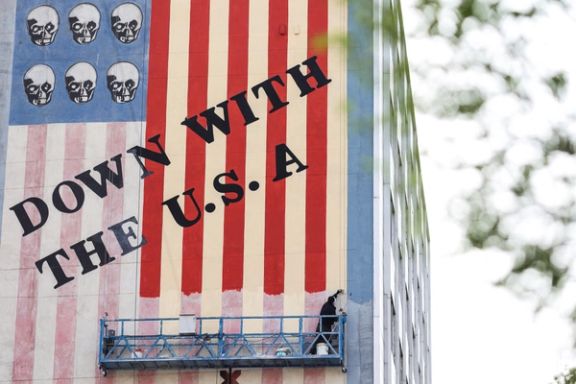
Iran's Foreign Ministry on Sunday emphasized the importance of maintaining the confidentiality of international negotiations and correspondence as it confirmed the exchange of messages with the United States.
The ministry said in a statement that keeping diplomatic processes private best serves national interests.
Also on Sunday, government spokeswoman Fatemeh Mohajerani reiterated that "Iran's response to the sent letter was prepared and delivered."
Writing on social media platform X, Mohajerani added, "In this regard, the path of indirect negotiations with the United States is on the agenda, and the diplomatic process continues."
The confirmation follows reports from Iranian officials detailing Tehran's response to a recent letter from US President Donald Trump, which, according to Iranian sources, reiterated long-standing positions, rejecting key US demands regarding its nuclear and missile programs, as well as its regional alliances.
While the specifics of the exchanged letters remain confidential, in line with the Foreign Ministry's statement, Iranian officials have offered insights into Tehran's stance.
Foreign Minister Abbas Araghchi confirmed earlier in the week that Iran's official response to Trump's letter had been conveyed appropriately via Oman, a traditional mediator between the two adversaries.
Araghchi reiterated Iran's unwillingness to engage in direct negotiations under what it describes as maximum pressure and military threats, though he noted that indirect talks could continue, as they had in the past.
Ahmad Bakhshayesh Ardestani, a member of the Iranian parliament's National Security and Foreign Policy Committee, also said that Iran had informed the US of its willingness to discuss the nuclear issue, but only through indirect channels and based on the framework of the 2015 nuclear deal, officially known as the Joint Comprehensive Plan of Action (JCPOA).
According to Ardestani, Iran's response rejected any discussion of its ballistic missile capabilities, which Tehran considers a matter of national defense and non-negotiable.
Similarly, Iran has pushed back against US efforts to curb its backing of regional groups, asserting that these relationships are based on bilateral agreements and that these allies are independent actors, he added.
"Given that Iran has no intention of acquiring an atomic bomb, as nuclear weapons have no place in our defense strategy, we are prepared to negotiate on this matter. However, discussions on other subjects are not on the table," he said.
On Saturday, the New Arab, citing anonymous Iranian sources, reported that Tehran's response mirrored the tone and structure of Trump's message, rejecting demands viewed as unreasonable.
The outlet said that Iran emphasized any nuclear talks must adhere to the original terms of the JCPOA and be based on mutual respect, resisting any attempts to broaden the scope of negotiations or impose new restrictions.
While Trump has said that a new agreement should guarantee that Tehran never acquires nuclear weapons, the JCPOA allowed limited uranium enrichment, which in the future can provide the technical means to obtain fissile material.
Regarding the mediators of the correspondence, Ardestani said that the US bypassed Oman, Switzerland, and Japan this time, possibly due to past unsuccessful attempts, and instead used the UAE, perhaps reflecting a more forceful tone. However, Iran delivered its reply via Oma, signaling its preference for a country it sees as more neutral.
Ardestani added that while the UAE received a copy, Oman is the messenger, likely due to Iran's higher level of trust.
The diplomatic overture unfolds against the backdrop of Trump's reimposition of a "maximum pressure" campaign in February, aiming to halt Iran's oil exports and force a broader deal encompassing its nuclear and missile programs, as well as its regional influence.
Trump has issued a two-month deadline for a new nuclear agreement, threatening military consequences if Tehran fails to comply. It remains unclear if Washington would accept indirect talks that from past experience could drag on for years.
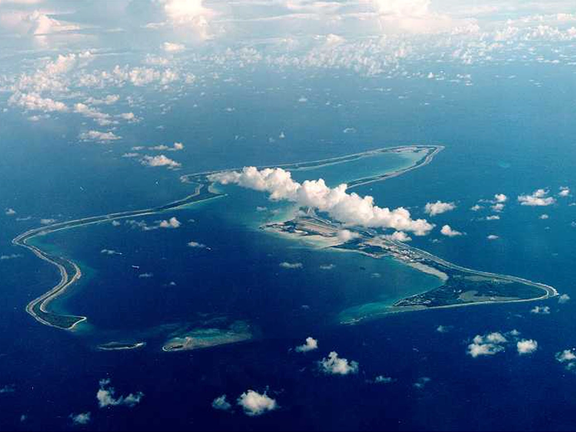
Iran would strike a British-American naval base in the Indian Ocean if it is attacked by the US, The Telegraph reported citing an Iranian military official, after Washington deployed long-range bombers at the strategic airbase.
B-2 Spirit bombers have arrived at Naval Support Facility Diego Garcia in Chagos Islands, a US Strategic Command spokesperson confirmed to Iran International earlier this week as Washington ramps up rhetoric against Iran.
In an apparent response to the deployment, a senior Iranian military official told The Telegraph, "There will be no distinction in targeting British or American forces if Iran is attacked from any base in the region or within the range of Iranian missiles."
“When the time comes, it won’t matter whether you’re an American, British, or Turkish soldier – you will be targeted if your base is used by Americans," the senior official was quoted as saying.
However, the Indian Ocean base is 3,800 kilometers from the Iran and Iranian ballistic missiles have a maximum range of 2,000 kilometers.
A British government spokesman on Saturday condemned Iran's threats in the strongest terms.
"The UK Government continues to work with partners across the region to encourage de-escalation. The base on Diego Garcia is vital to UK and US security and plays a crucial role in maintaining regional and international security," The Telegraph reported citing the spokesman.
The US military has deployed the B-2 stealth bombers along with C-17 cargo planes and 10 aerial refueling tankers in the last few days, defense industry outlet The War Zone reported on Wednesday citing satellite imagery.
The joint UK-US military base at Diego Garcia has previously been used to launch US strikes on the Middle East including Iraq and Afghanistan, with the deployment suggesting the potential for large-scale air operations in the region.
US President Donald Trump has in a letter to Iran's Supreme Leader Ali Khamenei demanded Tehran come to a deal over its nuclear program or face a military intervention.
The Islamic Republic, in response, has rejected any negotiations on its ballistic missile program or regional allies, and any nuclear talks beyond the framework of the 2015 nuclear deal.
Meanwhile, the US military continues a bombing campaign on Tehran-aligned Houthi fighters in Yemen, warning that any attack by the Houthis would be treated as emanating from Iran.
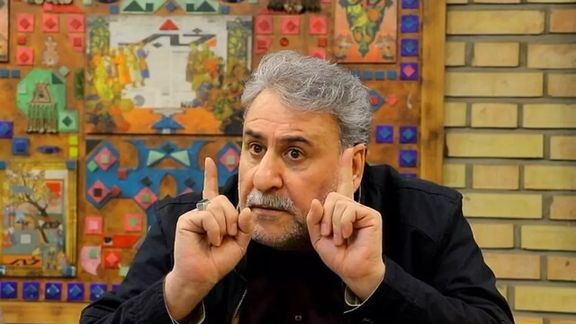
While Iran’s Foreign Minister Abbas Araghchi has repeatedly emphasized that Tehran is committed to holding indirect talks with Washington, a prominent politician in Tehran argues that President Donald Trump is unlikely to accept such negotiations.
Araghchi, widely seen as representing Supreme Leader Ali Khamenei’s position, has stated in multiple interviews and statements that Iran’s current strategy is to engage with the US through intermediaries.
However, Heshmatollah Falahatpisheh, former head of the Iranian parliament’s Foreign Relations and National Security Committee, told the conservative Nameh News website: “Trump will not accept negotiations through intermediaries.”
He also criticized President Massoud Pezeshkian for “lacking a clear foreign policy strategy,” arguing that while Trump appears to have a plan for every possible scenario, Iran’s president has yet to outline a vision for Tehran’s future relations with Washington.
Since Pezeshkian is widely known to have limited authority over foreign policy, the criticism may have been aimed at Khamenei, though the politician would not have dared to address him directly.
“Currently, Trump's plan is to force Iran to the negotiating table through maximum pressure,” Falahatpisheh said, adding that “diplomacy will have a chance if Trump moderates his stance.” He also made it clear that Trump seeks direct talks with Iran.
Falahatpisheh further noted that apart from some Persian Gulf states, most international players are focused on their own interests rather than easing tensions between Iran and the US. He pointed to the recent trilateral meeting between Iran, China, and Russia in Beijing, saying that both China and Russia were primarily advancing their own agendas rather than working to resolve Iran’s standoff with Washington.
Earlier this week, Khamenei's senior adviser Ali Larijani, as well as prominent economists in Tehran said that Iran needs to address its problems with the United States urgently in a bid to lift or reduce US sanctions and give the ailing economy a chance to grow after many years of crises and stagnation.
Iranian economist Mehdi Pazouki, an academic in Tehran told the press that Iran's economy is hostage to the country's failing foreign policy and Iran's inability to have amicable relations with the world.
Ali Ghanbari, another Iranian economist, told Iranian media that the country’s economy is under strain due to its foreign policy, which is not controlled by the Pezeshkian administration. Without explicitly stating that Khamenei, rather than Pezeshkian, oversees Iran’s foreign policy—particularly Tehran’s relations with Washington—Ghanbari described it as “a structural problem beyond the control of Pezeshkian’s government.”
Given this reality, Falahatpisheh outlined two possible scenarios for the future of Iran-US dynamics: “Either a war breaks out between Iran and Israel, with the United States carrying out precision strikes on targets in Iran—an escalation that would not stop there but spread across the region—or there will be no war, but additional countries will join the United States in its maximum pressure campaign against Iran.”
He noted that even China and Russia will cautiously support the United States in this case if Washington guarantees their interests.
Falahatpisheh noted that “Iran has not identified its opportunities in this situation or considered the consequences of what might unfold.” He blamed Pezeshkian’s passivity and inaction for the current state of affairs, suggesting that the president should begin the new year with concrete operational plans. Meanwhile, Pezeshkian’s stated approach has been to push forward Khamenei’s impractical vision of domestic investment as a path to economic recovery—without explaining how it would be implemented.
As inaction continues and unrealistic economic projections persist, the exchange rate for the US dollar in Tehran’s markets has surpassed one million rials. According to former Central Bank governor Mohammad Hossein Adeli, every Iranian household is effectively paying 180 million rials ($180) per month as a hidden cost of US sanctions. He warned that with each Iranian losing money to the sanctions’ impact on non-oil trade, the situation could become a serious security issue for the country before 2029.
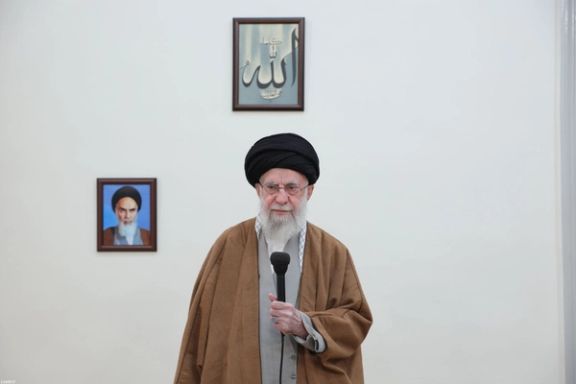
Iran’s formal response to US President Donald Trump’s recent letter reaffirms longstanding positions: no negotiations on its ballistic missile program or regional allies, and no nuclear talks beyond the framework of the 2015 nuclear deal, The New Arab reported Saturday.
According to the Qatari outlet quoting anonymous sources in Iran, Tehran responded “line by line” to Trump’s message, mirroring its tone and structure. The reply rejected demands viewed as unreasonable and emphasized that any talks on the nuclear file must be based on the Joint Comprehensive Plan of Action (JCPOA) and mutual respect.
Issues addressed by Tehran
The Iranian reply addressed four main areas: the nuclear program, missile and defense capabilities, Iran's ties with regional militant groups, and US threats of more sanctions and military action.
On defense matters, the response rejected any discussion of Iran’s ballistic missile arsenal, which Tehran considers non-negotiable. It also reaffirmed that its military capabilities are essential to national defense and not subject to external bargaining.
In the nuclear section, Iranian officials reiterated that they are open to talks, but only within the original terms of the 2015 JCPOA. They rejected any attempt to expand the scope of negotiations or impose new restrictions on the program, which Iran continues to describe as peaceful.
The letter also addressed regional issues, pushing back on US efforts to curb Iran’s backing of militant groups. “These relationships are based on bilateral agreements,” the sources said. “The allies are independent and do not take orders from us. Any agreement reached with these parties would be welcomed by Iran.”
This position had already been outlined publicly by Iran’s ambassador to Iraq, Mohammad Kazem Al-Sadegh, who said Thursday that Tehran’s support for what it calls the “axis of resistance” in Lebanon, Iraq, and Yemen is non-negotiable. Iran has rejected US conditions seeking to limit its regional influence and missile program. “We only negotiate the nuclear file,” Al-Sadegh said, adding that such talks would only take place if Iran’s full rights were respected. “We do not negotiate our missiles. We do not negotiate our regional alliances.”
The final section of the reply responded to what Iranian officials described as threats included in Trump’s letter. In its reply, Tehran linked any future direct talks to a change in Washington’s tone. The letter said that dialogue would require “dealing with Tehran on the basis of respect, without threats or maximum pressure,” according to The New Arab.
Iran’s decision to send the reply through Oman, rather than the United Arab Emirates—which had delivered Trump’s original letter—was a deliberate one, The New Arab reported. Iranian sources said the move reflected Tehran’s trust in Oman’s longstanding role as a neutral mediator and a rejection of what it saw as an attempt to bypass established channels.
Iran reiterates policy positions in official comments
Iranian officials have since confirmed the delivery and broad content of the response. Foreign Minister Abbas Araghchi said Thursday that the reply had been conveyed “appropriately” through Muscat. He reiterated that Iran remains unwilling to engage in direct talks under what he described as maximum pressure and military threats. “Our policy remains not to negotiate directly with the United States under pressure,” Araghchi said on state television. “Indirect talks can continue, as they did in previous administrations.”
Senior Iranian figures also addressed the letter publicly during Friday’s Quds Day rallies. Parliament Speaker Mohammad Bagher Ghalibaf accused the United States of using nuclear diplomacy to push for Iran’s disarmament. “When the US says negotiation, it means disarmament,” he said. “No wise nation accepts talks under threat.”
Ali Shamkhani, former head of Iran’s Supreme National Security Council, described the response as “restrained” and confirmed it was prepared by multiple institutions. He said indirect negotiations remained possible, but only if conducted on equal terms. “If negotiations are based on parity, we are prepared to proceed,” he said.
Trump’s letter included a two-month deadline for reaching a new nuclear agreement, Axios reported.
The United States reimposed its maximum pressure campaign against Iran in February, seeking to reduce the country’s oil exports to zero and force a broader deal. Alongside calls for limits on Iran’s nuclear and missile programs, Washington has also demanded that Tehran scale back its support for armed groups in the region.
Speaking earlier this month, Trump said Iran would have to return to talks or face consequences. “They’re going to have to speak to us one way or another,” the US president told Fox Business. “We can’t let this happen.”